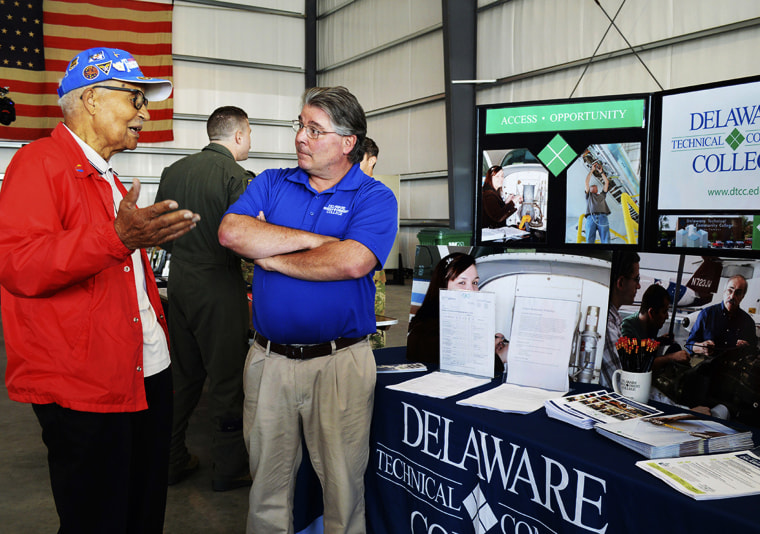GEORGETOWN, Del. — Growing up as a young African American in the 1920s and '30s, now retired Col. Charles "Charlie" McGee kept his feet on the ground.
Then, while an enlisted soldier in the U.S. Army, aviation addiction set in and his life through not one but three wars — World War II, Korea and Vietnam — was literally up in the air.
"I just fell in love with flying from the first step. I had never aspired to be a pilot," said Col. McGee. "But after my first flight I was hooked."
Three wars and 409 fighter pilot combat missions later, Col. McGee stands as one of the most decorated pilots in America's history as a proud member of the famed Tuskegee Airmen.
The 99-year-old Ohio native who now calls Bethesda, Maryland, home (was) the special VIP guest at 2019 Wings & Wheels, Georgetown's fall festival ... at the Delaware Coastal Airport. ...
The festival lifted off Friday (Oct. 4) morning with Pathways to Aviation Day, featuring Col. McGee and Ron Covais, a U.S. Air Force colonel and former Lockheed Martin president who served as political/military assistant to Secretary of Defense Dick Chaney.
Thirty-five high school students, predominantly sophomores, were in attendance for several hours of aviation expertise and information, interaction with aviation-related companies and institutions and tours of some of the attractions based at the airport.
Among the hands-on interactive offerings was a flight simulator, courtesy of the University of Maryland Eastern Shore Department of Engineering and Aviation Sciences program. Sussex Tech students were among those to take to the controls.
"That was awesome," said Tech sophomore Callum Neeley.
Col. McGee's advice to today's students is to believe in yourself.
"Find out what your talents are. Get the education. Learning to read, write and speak well. And develop those talents. You need it and our country needs it," said Col. McGee. "Certainly, for the students, I would say that don't let anybody tell you that you can't do something. Get the education. Persevere. Don't let the adverse circumstance be your excuse for not achieving. For the adults, mentor the youngsters, those youngsters out whether they are in your family, in the neighborhood or somewhere on the street. Of course, you have to be careful . . . but there are many out there that need the mentoring to keep them on the track to realize that they have a place in our country."
As an example of perseverance, the honored airman shared a family story.
"My son, graduating high school, had the counselor tell he and his mother that my son, Ron, was going to make a good truck driver," said Col. McGee. "That struck a lot in the wrong way. He went to college, got an aerospace engineering degree. He entered the military for a period, then went commercial, retired with over 30,000 flying hours for airlines — Continental and later United."
"And even as today because of his love of flying and his education, at this very moment he is in Tokyo, Japan, because Boeing rehired a couple of retired captains to help bring the Japanese pilots on board the Dreamliner 787 and the 777," said Col. McGee.
"Profound," said Mr. Covais. "The key take-away for the students in addition to given great exposure to history and perseverance, is you can be, and you can do anything you want. You just have to want it. And you have to work for it."
In March 1942, Col. McGee, as a sophomore engineering student at the University of Illinois, was a member of the National Society of Pershing Rifles.
"I am often asked how I got into aviation. I've said I was 'avoiding the draft.' I was in college. I was in Pershing Rifles and learned how to handle rifles," said Col. McGee. "I figured because I was in school my draft board wouldn't pull my number. I'm sure they had it."
After enlisting in the U.S. Army in October 1942, he earned his pilot's wings and became a part of the Tuskegee Airmen.
Col. McGee recalls some playful times toying with aviation as a school kid.
"Probably as a kid I made some paper aircraft to throw around the room, and wonder why the teacher was looking at me," he said. "But I had never been up in a plane or been to an airport."
His first taste of flying was in a PT-17, biplane open aircraft. "The first opportunity in something . . . it sold me," Col. McGee said.
Larry Kelley, pilot, aviation historian and co-founder of the Delaware Aviation Museum with John Kenney, shared the additional color barrier Col. McGee faced as a black person in the era of racial segregation.
"I grew up in south Alabama as a young kid," said Mr. Kelley. "We were on a farm out in the country. A big deal for us was going to town. For us it was Sears & Roebuck. That was Walmart of our age. I go to the back of the store and there are two water fountains back there, side by side. One says 'white' and one said 'colored.' To me, I thought they had colored water come out of them. I didn't know any better; six years old."
"That is the world this man grew up in. He could have easily taken a pass," Mr. Kelley said. "There were general officers in the United States Army that felt that a black man was not smart enough to be a fighter pilot. That was the ultimate in the military, to be a fighter pilot. These guys (Tuskegee Airmen) didn't believe that. They proved it wrong. Their history speaks for itself."
For his final words of advice, Col. McGee borrowed lyrics from a 1940s song by Bing Crosby and the Andrews Sisters.
"Accentuate the positive, eliminate the negative . . . and don't mess with Mister In-Between," said Col. McGee.
